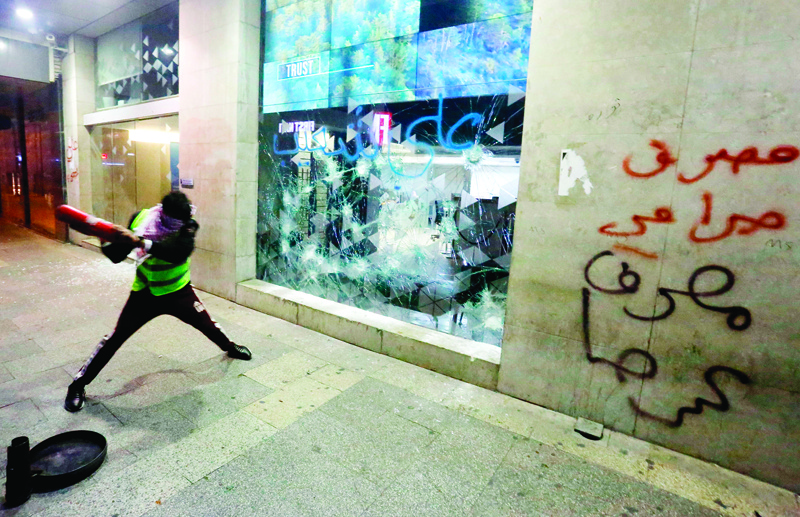
BEIRUT: Public anger against cash-strapped banks has boiled over in crisis-hit Lebanon, where demonstrators armed with metal rods, fire extinguishers and rocks attacked branches overnight in protest at controls that have trapped the savings of ordinary depositors. The Red Cross said yesterday that at least 37 people were injured in a night-time showdown as protesters smashed bank windows and scuffled with security forces in the capital's commercial district of Hamra.
Police said 59 people were detained, in one of the largest waves of arrests since Lebanon's anti-government protests began on October 17 demanding sweeping reforms. Demonstrators have turned their anger at the banks, most of which have imposed informal capital controls to stave off a liquidity crunch amid Lebanon's worst economic crisis since the 1975-1990 civil war.
Yesterday morning in Hamra, most branches were left with smashed windows, destroyed ATMs and graffiti-daubed walls, after what the Association of Banks condemned as a "savage" onslaught. Banks opened despite the wreckage, as cleaners scrubbed paint off walls and workers replaced smashed windows. "There is a lot of anger," Alia, a passerby, told AFP in front a damaged branch. "You have to go to the bank twice to withdraw just $200."
Yesterday evening, demonstrators gathered in front of the central bank and a police station where the detainees are held, demanding the release of arrested relatives and comrades. A few were released but more than 50 were still detained, activists said. Protesters also lit fires and blocked a key flyover in central Beirut, an AFP photographer said.
Since September, banks have limited the amount of dollars customers can withdraw or transfer abroad, in a country where the greenback and the Lebanese are used interchangeably. Although no formal policy is in place, most lenders have limited withdrawals to around $1,000 a month, while others have imposed tighter curbs. Prompted by a grinding liquidity crisis, the controls are increasingly forcing depositors to deal in the embattled pound - creating what experts are calling a de facto banking "haircut".
The local currency has lost over a third of its value against the dollar on the parallel market, plunging to almost 2,500 against the US dollar over the past week. The official rate was pegged at 1,507 Lebanese pounds to the greenback in 1997. Demonstrators accuse banks of holding their deposits hostage while allowing politicians, senior civil servants and bank owners to transfer funds abroad.
The central bank has announced it is investigating capital flight, saying it wants to standardize and regulate the ad hoc banking restrictions. Compounding the situation, debt-burdened Lebanon has been without a government since Saad Hariri resigned as prime minister on October 29 under pressure from the anti-government protests.
Lebanon's under-fire politicians have yet to agree on a new cabinet despite the designation last month of Hassan Diab, a professor and former education minister, to replace Hariri. Diab has pledged to form a government of independent experts - a key demand of protesters - but said last week that some parties were hindering his attempts.
Authorities condemned the night-time attacks and called for perpetrators to be prosecuted. Hariri called the rampage "unacceptable", while parliament speaker Nabih Berri questioned whether the aim was to "destroy the country". But in a strongly worded statement, United Nations envoy to Lebanon, Jan Kubis, blamed politicians for the turmoil. "Politicians, don't blame the people, blame yourselves for this dangerous chaos," he said, accusing them of inaction while watching the economy "collapse".
Increasing pressure on the premier-designate, demonstrators have returned to the streets since Saturday after a brief lull over yearend holidays. They staged a demonstration Tuesday outside Diab's house to launch "a week of wrath". But Hamra was the main target of Tuesday night's demonstrations, with protesters hurling stones and fire crackers at security forces who responded with tear gas.
Protesters daubed walls with graffiti, vandalized signage and lit a fire outside the head office of the Association of Banks. Showing no sign of backing down, demonstrators called for another protest outside Lebanon's central bank later yesterday. Main arteries were closed in north and east Lebanon and several schools stayed closed after the latest unrest. - AFP
.jpg)







